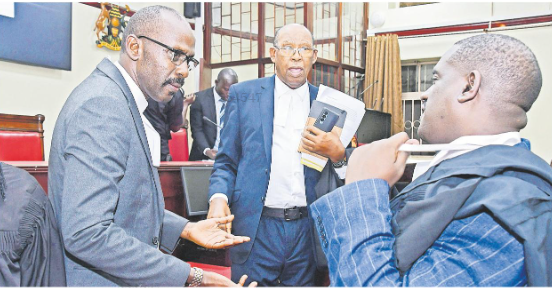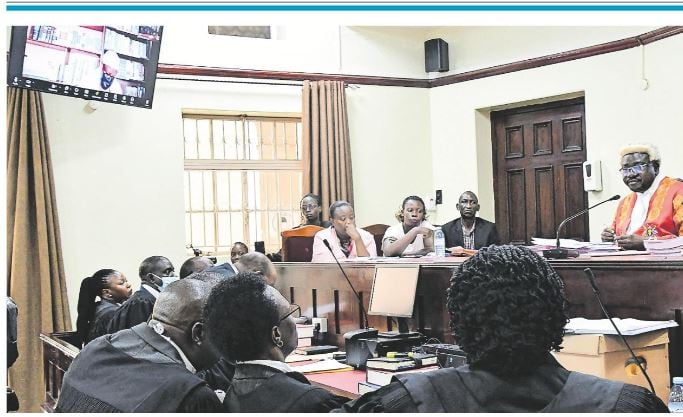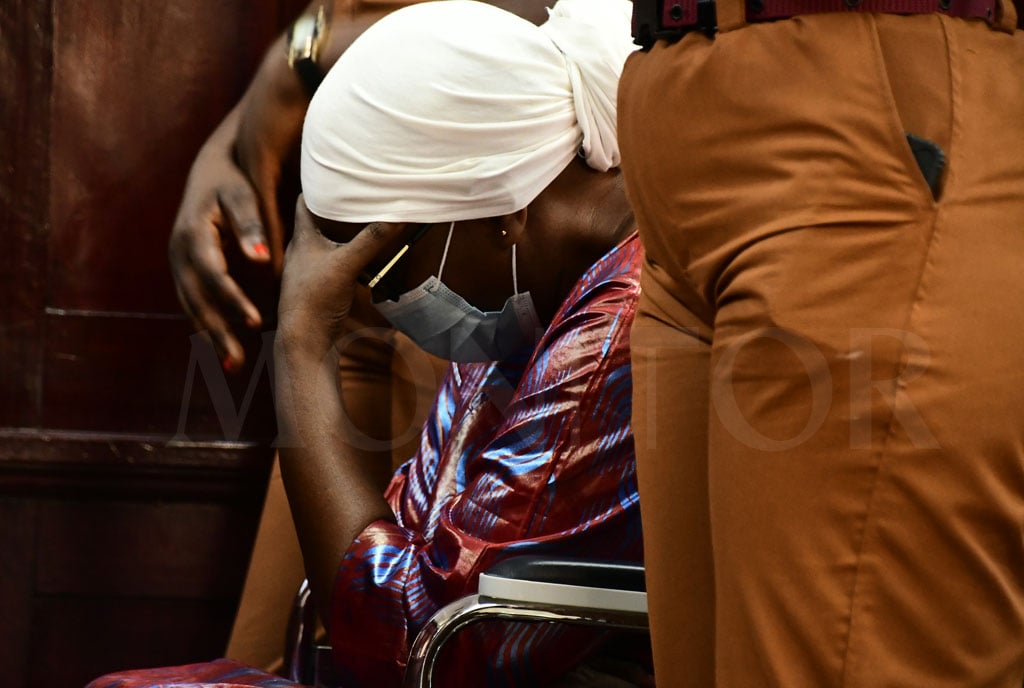
Lawyers make submissions before court in Kampala last week. Photo | Abubaker Lubowa
The defence lawyers and the prosecution last Thursday locked horns on whether the report containing the findings of the CCTV footage and information extracted from various mobile phones obtained at the residence of the late businessman Henry Katanga be allowed in court. In this excerpt, our reporter, Juliet Kigongo brings you the continuation (from Friday) of the arguments of Jonathan Muwaganya, a senior state attorney at the Directorate of Public Prosecutions.
Jonathan Muwaganya: My Lord, Section 31, which was cited by Mr Karuhanga yesterday, provides for search and seizure in relation to offences committed under the Act. It's very clear, offences under the Act. My Lord, if I may endow you just to read this section for court. Section 31, subsection 1a and b. It is provided that where a magistrate is satisfied with information given by a police officer that there are reasonable grounds for believing, that any offence under this Act has been or is about to be committed in any premises any other place may seize anything there if he or she has reasonable grounds to believe that the thing might be used as an exhibit in relation to an offence which he or she is investigating. My Lord, It is our submission that there are no requirements for such warrants before physical exhibits are recovered in the course of criminal investigations of this nature.
However, my lord, we want to clearly state that there is a clear distinction between the recovery of physical exhibits, including electronic gadgets, and the search for electronic devices. Recovery of physical electronic gadgets such as phones, DVRs, and devices, and the search for electronic devices; it is different, there is a clear distinction.
So my lord, in relation to the recovery of the physical devices, the police have the powers to seize and recover them and preserve them as such. But when it comes to searching or accessing the information contained therein, there is a very clear distinction depending on the nature of the case and the investigation, my lord, a court order may be required.
My lord, these facts are in parametrical with the circumstances before you. In addition, my lord, Section 27 of the Police Act provides for the effect that it is sufficient that a police officer conducting a search, carries out that search in possession of a warrant card and my lord, there is nothing in objection to suggest that the police officers that search to recover these exhibits never possess warrant cards.
My lord, we also want to draw your attention to section 6, subsection 1 and 2 of the Criminal Procedure Code Act, my lord, this provision allows for arrest by the police and taking possession and custody of any items recovered to be used in a criminal trial.
My lord, the third aspect of his objection was to the effect that the electronic devices recovered had to be returned to the accused persons within 72 hours. Our reply is premised under section 31 that he quotes was out of context and as we submitted it earlier, it is not applicable to offences under this trial in that context my Lord, the last aspect of Mr Karuhanga's contention was that he requested for documents and the prosecution never provided those documents, therefore, we can't rely on them without their consent or by court order.
My lord, in so doing, he cited section 163 of the Evidence Act, which makes reference to where documents have been referred to be availed upon notice.
My lord, the section is talking about documents and not feasible exhibits and when you look at the definition of a document under section 2 of the Evidence Act, it actually refers to a document as it is.
In this case, my lord, the only document that this witness could and after availed is the report that he authored and we disclosed it. So this section does not apply to physical exhibits. So, my lord, even with disclosure, we cannot violate the rules governing the handling and preservation of evidence.
And so, since the physical report was availed, my lord, we pray that you overrule the objection raised by Mr Karuhanga and allow the witness to complete his testimony and should the need arise, the defence can ask for time to study the physical exhibits produced to prepare to conduct the cross-examination.
My lord, in our view, that would be the issue for a fair trial, so in other words, my Lord, we respectfully disagree with the notion that we can only rely upon or traverse the physical exhibits and they are called only with the consent of the accused persons.
My lord, now briefly, since Mr Kabega had issues with the two letters vis-à-vis the court orders, my lord, first of all, the documents being talked about are not yet available to the court. Our colleagues, prematurely, assumed that what they viewed as disparities could not and would not be explained by the witness. So his concerns, my lord, are premature and pre-emptive. But because my lord, he raised these matters, you realise that the letter does not refer to a specific court order. So, here you have put us in a treated position because, on my own, these are the pieces of evidence that the witness should be allowed to go through his evidence, traverse, and if there are any issues, then they can be raised in the process.
The issue that the magistrate commissioned and also had the application for the court order, my lord, once an order is given by a court, whoever has issues is aggrieved by anything either in its context or in the underlying process for its acquisition can only challenge it through the court either by way of appeal or review or otherwise. So my lord, with due respect my colleague, Mr Kabega cannot invite this court now to constitute itself into an appeal to evaluate the merits of how this court order was issued.
My lord, I was submitting that this court has previously guided, even in respect of other previous court orders, my lord, those formal disparities or inadequacies do not affect the force in the order. Once a court order is issued, you can only challenge it and have it overturned.
Karuhanga: In a brief rejoinder my learned friend began by addressing you on how the expert does not have everything on phone but only extracted what was relevant. That is precisely the problem, that there may be information in those phones for an exculpatory nature for the accused requires for their defence. But it is also imperative to understand from this witness, what the witness said, and what exactly the witness has through a number of telephones, computers. The witness told this court that he was asked to examine the exhibits as to whether they contained relevant information pertaining to the case of murder by shooting and prepare a report that prompted the commissioning of the offence. He also said, my lord, that he was asked to image and extract communications between the exhibits. So he imaged all the communications on those phones. He says he was asked to ascertain all communication on social media platforms, text messages, and phone calls. He said he was asked to ascertain what type of communication exists. He was asked, my Lord, to look at the phones and see whether there is any communication, whether on social media or outside of the phone. He said that he was asked to then perform any other necessary examination. My lord, he said he was asked on the DVR, to extract information between the 1st of November at 5am and the 2nd of November at 11am with a video recording.
My lord, do you know how many minutes of that video have been disclosed? Zero. The prosecution has within 48 hours of video, and they have disclosed zero. The argument they have made, so first of all and they are saying that maybe other things they may have disclosed that may not be valid. This is precisely the problem, my lord, is that in the possession of the prosecution, the information they are suppressing and hiding from the defence. And then they are trying to use this information selectively to aid the prosecution. My lord, my learned friend, in justifying this, expressed rather boldly, and almost shockingly, a claim that he was protecting the privacy of our clients from their lawyers and can only be allowed to give this information if all the accused persons consent. And if all of the accused persons consent, My lord, there is a fundamental desire to start getting two things. One, the fairness of the trial and two, the role of the defence counsel. We do not stand at this bar as advocates of ourselves. We don't stand at this bar pursuing our own causes. We stand here as officers of this honourable court as facilitators of justice. The whole idea of the government protecting people they are trying to prosecute and prosecute from their own lawyers. This is a vast injustice that Mr Muwaganya can see it, but I cannot, in defence of the accused persons. It is absolutely shocking. Worse still, that the witness, the police officer, can see it, and that the accused persons cannot.
Judge: Ruling on November 12 (tomorrow) at 10am.









